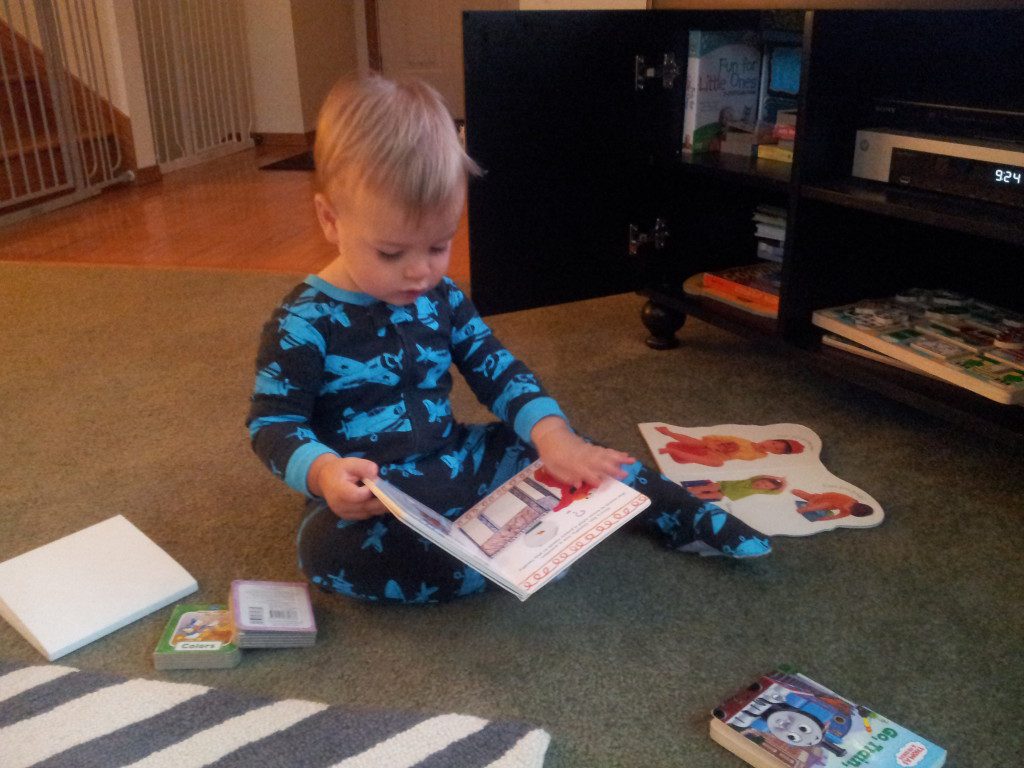A year ago, my son was about to turn 2 and had never said the word “Mama.”
Or “Dada.” Or “ball.” Or “up.” Mason was silent and stoic, and we were nervous.
 Our pediatrician frowned at the communication questionnaires I filled out and recommended speech therapy. I frantically Googled things like “2 year old won’t talk” and tried to ignore the voice in my head.
Our pediatrician frowned at the communication questionnaires I filled out and recommended speech therapy. I frantically Googled things like “2 year old won’t talk” and tried to ignore the voice in my head.
We did everything we could think of to get him talking. We talked and read to him constantly, we bought flashcards with bright pictures on them, we implemented ideas from the book our pediatrician recommended.
I remember being with Mason at the library and chatting with another mom, whose son was 9 months younger than mine and talking up a storm. I was so envious of their interactions. “You’re right, that is a ball! Yes, a blue ball!” When she asked how old my son was and I told her, she looked confused. (Or maybe I just imagined it.)
During a parent-teacher conference at Mason’s daycare, I saw two words on his development report that I’ll never forget. Under communication skills: “extremely delayed.” I went home in tears.
Today, Mason is a few months from his third birthday, and he’s a total chatterbox. His vocabulary includes hundreds of words–too many to count, and more every day. His pronunciation isn’t as sharp as some kids’, and his sentences aren’t quite as sophisticated, but you’d never guess that a year ago he was only babbling.
If you’re the mom of a quiet toddler: be encouraged.
We all know that every child is different, and that they all learn at their own pace–or at least, we “know” that–but those darned milestones have a way of shaking our faith. (Unless our kids are meeting them early, in which case: look how smart they are!)
And of course, we ALL have friends whose kids are doing things sooner/better/easier…
One thing I’ve learned is to to recognize when a behavior is more a reflection of my son’s personality than his development or my parenting. Even though he’s talking now, Mason is still a reserved kid by nature. It takes him awhile to warm up to new environments and new people, and until he does that, he’s quiet. (I know: not the worst thing in the world for a toddler!)
Oh, and we did get that speech therapist, for a few months. She was wonderful with Mason, but she helped me even more. She had complete confidence in my son, when my own was faltering, and she gave me things to do so I could feel like I was “helping.”
In the end, though: my son talked when he was ready. Not a second sooner.
If you’re the mom of a late talker, and you find yourself wanting to feel like you’re helping, here are a few ideas to try. (This is a mix of tips and tricks from our speech therapist and our own experiences–but as always, remember that every child responds to things differently!)
Get your child’s ears checked
I was extremely reluctant to do this, since Mason seemed to hear fine–he reacted to sounds, responded to his name, etc. But even a small amount of hearing loss can impair speech development. (I’ve read that it’s like being underwater–imagine trying to learn a foreign language that way!)
In the end, a visit to the audiologist did detect some hearing loss, and the doctor recommended ear tubes. Mason didn’t start speaking until several months after the tubes, so we’re not sure how much we can credit them with his progress, but we definitely didn’t regret getting them. (Bonus side effect: no ear infections!)
Figure out what motivates your child
This was our speech therapist’s very first piece of advice. The idea is to teach kids that communication helps them get things they want–it’s not just for pleasing Mom and Dad. So instead of encouraging them to talk just for the sake of talking (“can you say Mama?”), save the prompting for things they care about.
Food and drink are common motivators. If your child wants a drink, withhold the cup a little bit and see if he’ll say “milk” (or whatever) to get it.
Encourage interaction through sounds
Sounds are precursors to speech and a great place to start. Talking about animal sounds is perfect for this, especially if your child is into animals.
Our son was into one thing, and one thing only: cars. So, our speech therapist encouraged as much vroom-vrooming and beep-beeping as possible.
Let them finish
Mason’s first word was “go,” and we got him to say it by prompting him with the phrase “ready, set, go.” We started using the phrase while playing with his cars, and once we were sure he was familiar with it, we’d say “ready, set…” and then wait. We did this over and over and over, and eventually, it clicked.
This method works great with books too–especially rhyming ones. Once you’ve read the child the book several times, try pausing before the last word of an easy sentence to see if he’ll fill in the blank. We still do this all the time with Mason, and he loves the opportunities to participate.

Get the child’s attention
We were coached to come down to Mason’s eye level and wait until he looked at us to speak (when prompting him). It was amazing how often we weren’t taking the time for this simple step.
Wait longer than usual for responses
We noticed that if we gave Mason a prompt and he didn’t make an effort to respond right away, we’d keep repeating the prompt. “Up? Can you say up? Do you want up?” But the problem wasn’t that he hadn’t heard us.
Eventually, we learned to wait an uncomfortable amount of time after a prompt, to give him plenty of time to respond if he wanted to.
Keep the pressure off
Mason used to get (actually, still gets) stage fright if he felt like he was being put on the spot. Sometimes, when he’d be playing alone, I’d overhear him making car sounds and bud in with comments like, “that’s right, buddy, vroom-vroom!” When he’d realize I’d been listening, he’d look flustered and immediately clam up. #fail!
Make a personalized picture book
Mama and Dada are often kids’ first words because they’re easy to say. But for some kids, the in-their-face interaction that’s usually happening when they’re taught those words can be intimidating. It can be helpful to encourage speech while focusing on something else–like a book.
We got a blank board book, like this one, and filled it with pictures of my husband and I, as well as all of Mason’s favorite things: a car, a truck, Elmo, and Mickey, plus some easy-to-say words like dog and ball. He loved it!
Don’t let the milestone police get you down
In retrospect, I wish I wouldn’t have let my pediatrician’s concerns get to me so much. I understand the importance of early intervention in some cases, but my son wasn’t showing any other concerning signs, and I had so many people (including the speech therapist) assuring me he’d catch up. Why was I so focused on the worst case scenario?
My final tip (and this applies to basically anything parenting-related): whatever you do, beware of Google!
To mimic what I heard many, many times during that phase: hang in there, Mama. Before you know it, your kid will be talking your ear off, and you’ll look back with fondness on those sweet, silent days.


















I have a question though… If he had slight or moderate or mild hearing loss… After the tubes did you have to start using hearing aids? How did they treat to hearing loss?
Ive never read something so relatable, i literally felt as if you were talking about my son
I can breath a little now
Thank you so much
This goes for me also….I have a 2 year old son that doesn’t talk. We are doing speech therapy and going to see a developmental pediatrician. Thank you for giving me hope and restoring my faith. Thank you!
I am so encouraged by this article and it’s a relief to read some of these comments. My son is 2 in a month and only babbling and pointing. We went to a couple doctors who have scared us about the risk of autism but he is generally is totally engaged, responds to his name and is affectionate/makes eye contact. I have been totally freaked out for weeks, crying and looking up youtube videos and articles. Such a nightmare. We were working with a speech therapist over zoom which was useless and we just started in person which has been better. I am going to try some of the tips from this post, thank you so much for sharing your experience.
I have a question my daughter 23 mouth still babbling she said some words but not to many
OMG!
Thank you ! My son will be 2 in two months and I have been driving myself crazy with Google searches .
Hi everyone! Just reading this because my mom told me I didn’t talk until I was two and I wanted to see what other people had to say about it! Just to let everyone know, I graduated from high school as Valedictorian, I will be graduating from UW-Madison in the top 20% of my class, and I have no speech problems at all to this day! I promise it will all be ok:)
Thank you so much for this! This could be about my son, he just turned two a couple weeks ago and barely talks, he babbles still mostly, but he definitely understands and is a bit reserved but very affectionate and makes loads of eye contact and is always wanting to play with us. I have been driving myself crazy with googling about autism because of course that’s what people ask you once you say your two year old doesn’t talk. Worried out of my mind but this article helped so much! Thank you!!!
Wow … You gave me such encouragement with this article. My son is 2 and a half and I’ve been trying to stay positive when seeing so many kids his age and younger talking. I’ve felt this same way. You made my day. Be blessed!!!
Thank you soo soo much for sharing this. My son will be 2 in four days and he doesn’t talk much he says a couple words like no ma hello hi bye or night night. We dance read play sing his favorite nursery songs and he does the song or hand gesture ( wheels on the bus starts rolling hands head shoulders knees and toes starts pointing to body parts and etc ) but I was worried because he doesn’t really talk that much it’s when ever he feels like it. He’s very smart he lets me know what he wants and exactly when he wants it by pointing or bring me things maybe even trying to pull me in the direction he responds to his name and etc. Between the pediatrician and google I was starting to think something is wrong with my baby but this article gave me hope. Between this pandemic and not being able to have my son around more children or do more things I feel like this plays a part. Every child that I know personally started talking more once in daycare and around more children and mimic what they see other children doing. I’m noticing a lot of people who commented has a son it may just be that boys develop a little slower … just a thought from a small observation I noticed. I’m no expert but I’m just trying to stay positive and not think the worst but still be mindful that there may be a problem and things I need to look out for . Based on the comments I think I’m going to still get him a speech therapist just to see if that helps any and also take him to the ear doctor to make sure everything is fine.
Thank you for this!! I needed to read this today… my baby girl will be 2 in a couple of months and not speaking nearly as much as I’ve read that she should be speaking.. a couple of months ago I had contacted her pediatrician to ask the tough questions on whether or not I should be concerned or not and rather than be I guess encouraging and reassuring, basically told me that yes, kids at 19 months should be saying yo to 50 words or something like that and that if I’m concerned, she can send over a questionnaire to fill out so the speech department can determine what action should be taken if necessary. Naturally, this freaked me out and I said yes absolutely send this test over! I get this 4-5 page questionnaire, front and back, and no lie, I refused to look at it for a week! I was deathly afraid that it would indicate something was wrong and I wasn’t ready. When I finally forced myself to look at it, she had been doing ALL of the things on that damn questionnaire EXCEPT forming the 2 words sentences and she had been for quite some time..I changed pediatricians. I realized that I too, need to stay off Google (although I do relapse from time to time, as I DID find this article LOL) and I needed to have more faith and confidence in my baby. We still do all of the things to encourage her-reading, flash cards, etc and I will definitely look into getting her hearing checked, but I am trying to be more patient and less anxious.. my biggest fear is that I am doing something, or NOT doing something when it comes to her growth and development, and that it would affect her negatively.. so thank you for this!! It’s comforting to know that I’m not alone!!
And I’m definitely going to get her ears checked!
Thank you for this post! Our twins just turned 2 and are flat-out refusing to talk. They understand language (do things when we ask like “go get your shoes” or “close the door” or “wave hi”) but when we push them on talking… well it just isn’t happening. They babble all day long and love books, songs, and animal sounds. Google, Pinterest, and even our pediatrician has been unforgiving and frankly making us feel like parental failures or that something is wrong with our children. Thanks for the actual useful tips and encouragement and fingers crossed something will click soon 🙂